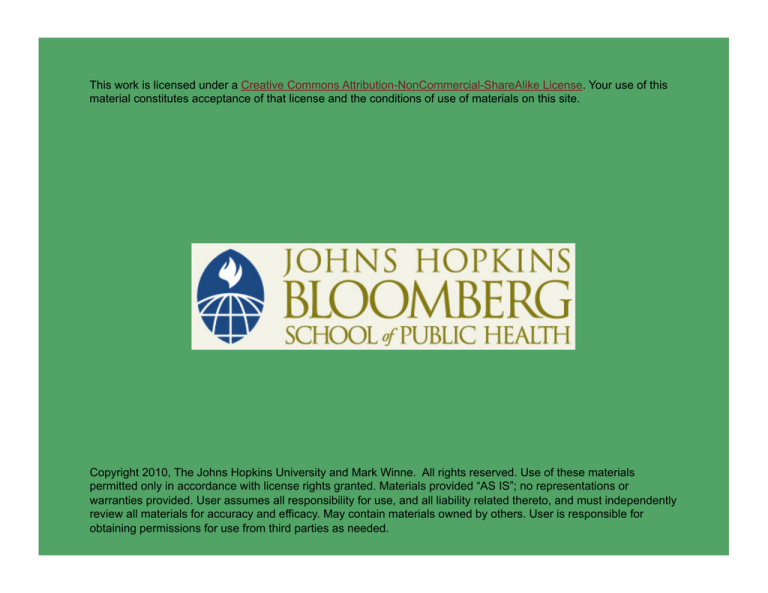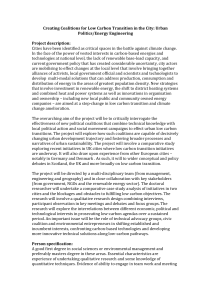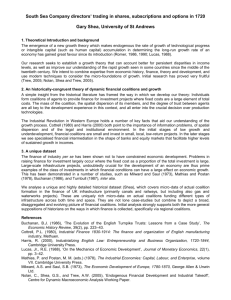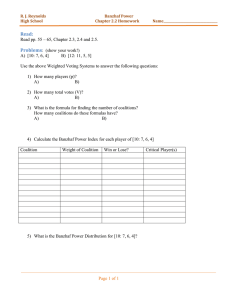
This work is licensed under a Creative Commons Attribution-NonCommercial-ShareAlike License. Your use of this
material constitutes acceptance of that license and the conditions of use of materials on this site.
Copyright 2010, The Johns Hopkins University and Mark Winne. All rights reserved. Use of these materials
permitted only in accordance with license rights granted. Materials provided “AS IS”; no representations or
warranties provided. User assumes all responsibility for use, and all liability related thereto, and must independently
review all materials for accuracy and efficacy. May contain materials owned by others. User is responsible for
obtaining permissions for use from third parties as needed.
Section B
Future Perspective
3-Ps: The Community Food Security Method
Projects
Partnerships
Policy
3
Projects
Community gardening and urban agriculture: show more promise for
community building than for promoting food security
Food co-ops: limited impact on low-income communities; limited
business management capacity
Photo by Flatbush Gardener. Creative Commons BY-NC-ND. Retrieved from
http://www.flickr.com/photos/flatbushgardener/2669248981/sizes/l/
4
Partnerships
Anti-hunger coalitions: food only, neglect poverty; ignore economic
disparities
Coalitions start to broaden: anti-hunger, sustainable agriculture,
and public health begin to join forces
Emergence of obesity and diabetes issues broaden coalitions; food
system’s connections become apparent
5
Partnerships
Anti-hunger coalitions: food only, neglect poverty; ignore economic
disparities
Coalitions start to broaden: anti-hunger, sustainable agriculture,
and public health begin to join forces
Emergence of obesity and diabetes issues broaden coalitions; food
system’s connections become apparent
6
Convergence: Policy
Supermarket development (food to the people): projects that would
not succeed without policy
-
-
New Haven, Connecticut
Fresh Food Financing Initiative (Pennsylvania)
Public transportation (people to the food)
- New bus routes in Hartford
7
More Convergence
Farmers’ markets (projects, partners, and policies): connecting
justice and sustainability—farmers’ markets grow in low-income
areas; Farmers’ Market Nutrition Program and EBT
Community supported agriculture: private innovation and public
strategies
8
Unifying 3-Ps: Food Policy Councils (FPCs)
Specific geographic and jurisdictional focus
Considers all elements of the food system
Multi-stakeholder orientation
1. Coordinates food system players
2. Influence local or state food policy
3. Food democracy in action
9
FPCs: Issues and Results
Farmland Preservation (Connecticut and Montana)
Nutrition rules in schools (New Mexico)
Improved food economy (Michigan)
Improved WIC Program (Hartford)
Farm to School (New Mexico and New Haven)
Sustainability planning (Portland, Oregon)
10
Challenges
Oligopolistic forces of multi-national agribusiness
Food banking still dominates public’s understanding of hunger and
poverty
Low-wage economy and need for living wages—holding the for-profit
sector accountable
Obesity threatens nation’s health and health care cost containment
11
Opportunities
Local and state food policy
Over 100 FPCs in North America
New York City food strategies
Cleveland and urban agriculture
Gardening, cooking, and food democracy as pathways to individual
self-reliance and community health
12
Finding the Balance
Food system comprised of many parts (and many uncommon
connections)
Can’t forget hunger’s cause (poverty)
Can’t focus on only your food (your health)
Farmer has right to earn a livelihood, but not at expense of
consumer or the natural resources
Closing the food gap is a multi-faceted enterprise that requires we
connect many dots
13









